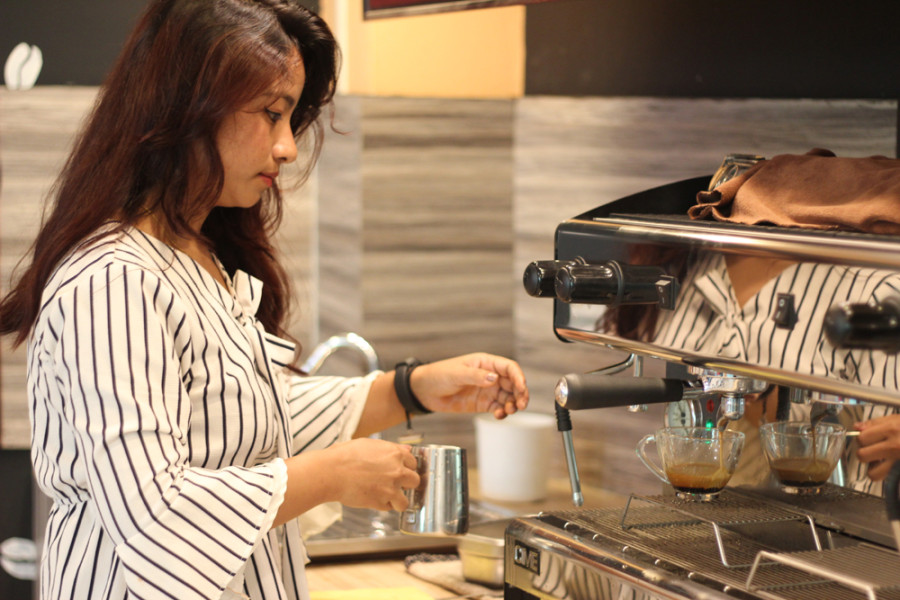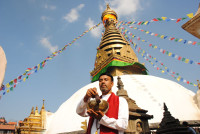Life & Style
The number of young people taking barista courses is increasing, but mostly to find jobs abroad
Although it is uncertain whether Nepali students are actually finding jobs abroad with the training they receive at these barista schools, the popularity of such schools is on a constant rise.
June Karkee
Bandita Magar considers herself an avid coffee drinker. She enjoys drinking coffee so much that she recently decided to undergo a 19-day training at The Barista’s Coffee School in Gathaghar, Bhaktapur. She picked up the essentials quickly, on how to become a barista and make 21 different beverages, from basic drinks like lemonade to coffee specialities like lattes and frappes.
“I have always been interested in learning about making different versions of coffee and felt that this training is a great opportunity,” said Magar, 23, who spent Rs15,000 for the course.
With the coffee-drinking culture growing in Kathmandu, many young people like Magar are taking barista courses offered by a number of schools and training institutes mushrooming in the Valley. But unlike Magar, who chose to take up the course out of her affinity for the beverage, the majority of people are attracted to barista courses because they believe that the skill will be helpful to land them jobs abroad—whether they are planning to move abroad for studies or for foreign employment. The number of people training to step into Nepal’s coffee market is significantly smaller.
“Many students also think that it can be a transitory profession for them when they move abroad,” says Manoz Shahi, training director at the Barista’s Coffee School.
Shahi started his coffee school in 2017 in Dillibazaar and Bhaktapur, and has since trained more than 2,000 students so far. Although a majority of his students take the training courses as a part of their preparation to move to a foreign country, he says that that clearly wasn’t his primary vision with which he started providing the courses.
“Our courses not only focuses on coffee making but also on providing basic customer service skills as well as entrepreneurial skills,” he says. “This is to foster an environment where people can establish their own coffee ventures.”

The 15-day barista training package at Shahi’s school provides students with basic theoretical knowledge on the history and culture of coffee, as well as practical classes on things like how to make espresso and develop tasting skills. A shorter three-day latte art class, on the other hand, focuses solely on preparing and presenting lattes. At the end of the course, students are required to take an objective test and are provided with a certificate of completion if they are able to pass the test. Those who do not perform well in the test need to undergo additional training.
“The trainers were really helpful, and the school was well equipped with high-end machines,” says Magar, who also shared that she scored the highest from her batch on the objective test.
But for others, who are specifically taking courses to move abroad and find jobs at coffee shops, a certificate alone isn’t enough to guarantee a job, says Suman Singh Thapa, who currently works as a barista at Pasta Pantry, a cafe in Sydney, Australia.
While the training provided by these barista schools are thorough and extensive, in many cases, the employees demand work experience.
“I wouldn’t say that the training wasn’t helpful, but it was not enough for me to find a job in Sydney,” he says. “Even here, cafe owners usually look for people who have already had experience in Australia.”
But Sanjeev Shrestha, founder and trainer of The School of Coffee Beans, another barista training school, says that the art of coffee making also depends on the individual. Even after undergoing training at barista schools, it is important to keep practising to hone one’s skills.
And although it is uncertain whether students are actually finding jobs abroad with the training they receive at these barista schools, the popularity of such schools are on a constant rise, says Shahi of Barista’s Coffee School. According to him, around seven to eight new barista training schools have been opened within the last three months in Kathmandu alone, and they mostly tend to attract younger people.
“When we first opened, there were just a few schools and most of them were situated at reputed coffee places like Himalayan Java, but now people are treating it more like a lucrative business,” he said. “But coffee is an art, not something that should just be profitable.”
However, Shrestha says that at least 40 of his students who underwent training at The School of Coffee Beans have already found employment inside the country, with some even opening up their own businesses.
But Shahi believes that such number barely account any significance. He says that many things still need to be improved to really develop a coffee culture in Nepal, the way it is established in other countries. Although young people’s growing interest is encouraging, their lack of interest in planning their future in the country is disheartening, he says.
“A lot of young people join these training schools because they seek opportunities abroad,” he said.
He also believes that this has also hindered baristas in the country to grow as a community and is consequently stalling the growth of the coffee culture.
“In a few years, many international organisations may enter the Nepali coffee market,” says Shahi. “By then, we need to be prepared. So, it’s important to share and provide everyone with the same amount of knowledge and skills.”




 14.12°C Kathmandu
14.12°C Kathmandu










